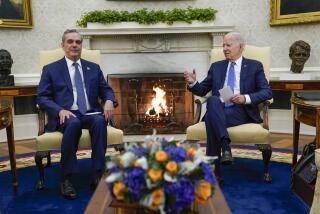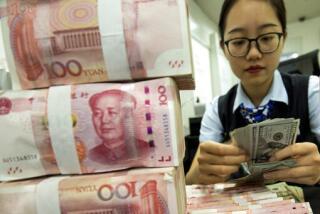Banking on China as a Trade Gold Mine : Asia: The Export-Import Bank hopes to boost U.S. business with Beijing with low-rate loans.
Westinghouse Electric Corp. recently took advantage of the growing Chinese economy by signing a $140-million contract to supply power generators in China.
As with U.S. companies seeking opportunities in China, the deal was made possible in part by financing from the U.S. Export-Import Bank.
The Ex-Im Bank--a government lending agency that seeks to boost U.S. exports--hopes to play a big role in increasing U.S. corporate activity in China, bank Chairman Kenneth Brody said Thursday after returning from a trip to China promoting U.S. business there. China--already the bank’s largest lending market in Asia--will become its biggest lending market in the world over the next few years, he said.
“Our purpose is single-minded: Create American jobs by financing U.S. exports,” Brody said. The bank estimates 20,000 American export jobs will be created for every $1 billion that the bank lends to support U.S. trade with China.
Chinese trade analysts say there is immense potential for American companies to tap into the Asian nation. With a burgeoning infrastructure, China plans to build 60 new airports, buy airplanes, install power facilities and construct phone lines.
Also, because Chinese foreign debt is very low and growth is so strong, there is confidence that China will repay its loans, said Wei Li, assistant professor of economics at the Fuqua School of Business at Duke University.
“For a lot of U.S. companies, it’s the recognition that now there is a very specific market niche for them,” said Vanessa Whitcomb, associate editor of China Business Review.
The Ex-Im Bank promotes trade through loans to foreign companies and countries under the condition that they will buy goods and services from American companies. U.S. companies who need money to begin exporting products are also supported through various loans.
The bank supported $1.3 billion in exports to China in its fiscal 1994, a 63% increase from $800 million in fiscal 1993. Applications are being reviewed for another $3.3 billion in support funds for future projects in the country.
Expanded Ex-Im Bank financing of exports to China is part of the Clinton Administration’s new policy to help U.S. companies compete more effectively in the global marketplace through what is called “Tied Aid,” or government-backed aid.
Until recently, U.S. companies received very little support when up against foreign corporations that were supported by low-interest, long-term loans from their respective government lending organizations.
But since 1993, under the new Clinton Administration policy, the Ex-Im Bank has provided its own long-term, low-rate loans--called “soft” loans--to aid U.S. exporters.
This will level out the playing field when American companies bid against foreign competitors for contracts, said Brody. “Ex-Im Bank has decided that getting in on the ground floor will create more opportunity for our exporters,” he said.
Brody met with industry ministers and heads of several large Chinese banks during his eight-day trip throughout the country. Thanks to China’s substantial economic and policy reforms, the U.S. government has further expanded economic relations with the country. The bank is considering stationing an Ex-Im representative to China within the U.S. embassy there, Brody said.
More to Read
Inside the business of entertainment
The Wide Shot brings you news, analysis and insights on everything from streaming wars to production — and what it all means for the future.
You may occasionally receive promotional content from the Los Angeles Times.










